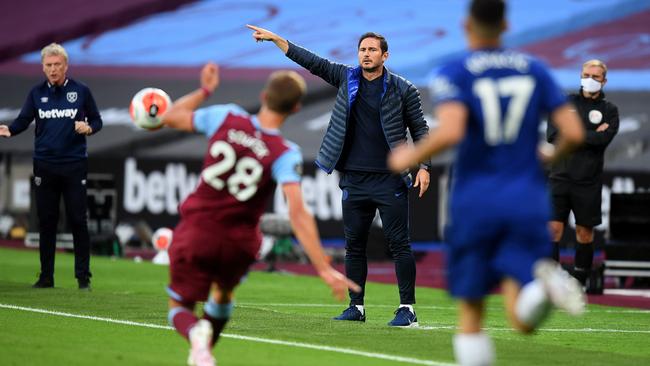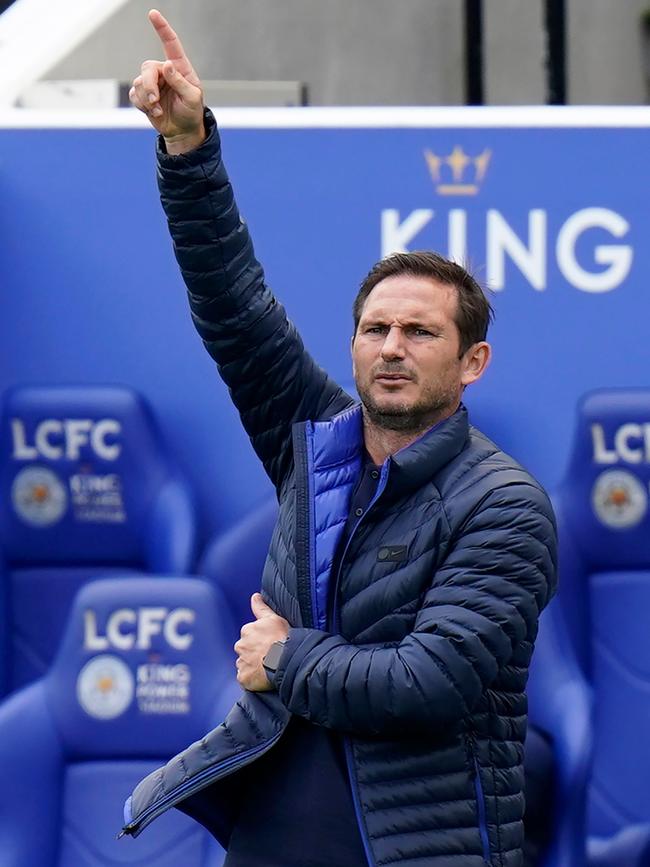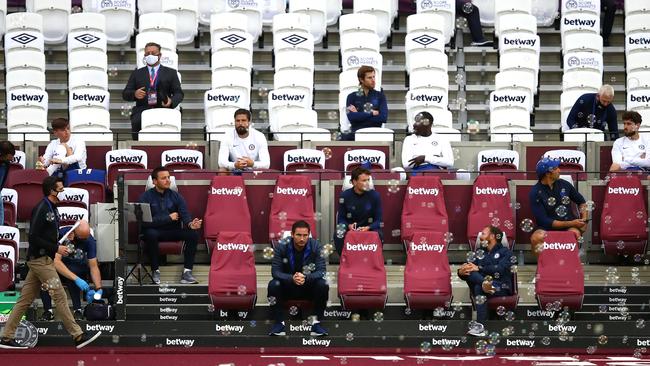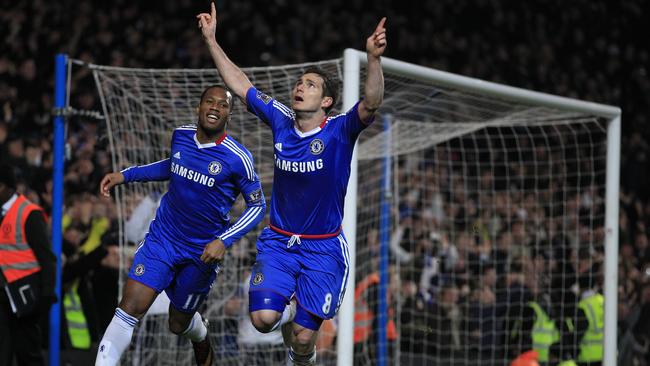How Frank Lampard is remaking Chelsea in his own image
A year on from Frank Lampard’s appointment as Chelsea’s head coach, it is clear the club has made a good decision.

It is mid-morning on Friday, July 5 last year and the entire staff at Chelsea’s Cobham training base have been summoned to the media centre. The players are joined by cooks and kit men as they shuffle past a purring coach, which waits to take the team on a pre-season tour, and into the mini-theatre to hear from the man who is both old and new at this club.
Two nights earlier, Frank Lampard had signed a three-year contract to become the Chelsea head coach, returning to the club where he earned legendary status after winning 12 trophies in 13 seasons as a player.
Alongside him in the office at Stamford Bridge was Steve Kutner, Lampard’s long-time agent, and Marina Granovskaia, the Chelsea director and Roman Abramovich’s most trusted employee with whom he would work closely over the next 12 months.

Granovskaia remained in sight for the unveiling press conference with the world’s media the next day, a clear symbol that Lampard was Abramovich’s man. Early indications that this was a shrewd appointment were felt in the media centre at Cobham on that Friday morning.
It was a only a five-minute meeting but a significant one as Lampard sowed the seeds of a sense of community at Chelsea. He told players and staff that he was delighted to be back at his club, that they were in it together, that he wanted everyone to feel a sense of pride when they drove in and out the training ground’s long tree-lined driveway each day.
An instant connection was formed as this was an act no manager in the Abramovich era had done before. Not Jose Mourinho, not Antonio Conte, and certainly not Maurizio Sarri. One year on and Lampard is on course to achieve the demands set by the club’s owner by qualifying for the Champions League and competing for silverware, having reached the FA Cup semi-finals.
A three-month suspension to the season means the outcome of that first year is yet to be completely clear. But the restart has provided a mirror to the campaign as a whole. Last week’s victory over Manchester City represented significant progress under Lampard, the result of a week spent focusing on their defensive shape against a fluid Pep Guardiola attack, that left some tipping Chelsea to be title contenders next season.
Less than a week later, Lampard was quiet in the away dressing room at the London Stadium after his side squandered the lead against relegation-threatened West Ham United.
Despite some inconsistency, the former midfielder has been a clear success as he has balanced the impact of a transfer ban and the loss of the highly influential Eden Hazard. Success is emphasised by the progression of academy products such as Tammy Abraham, Mason Mount, Callum Hudson-Odoi, Reece James, Fikayo Tomori and Billy Gilmour.
The invisible barrier that had been in place between the academy and first-team buildings had been pulled down. Cheers were heard from the academy when Lampard’s appointment was announced. His coaching team, with Chelsea’s former youth-team managers Jody Morris and Joe Edwards, along with promoted fitness coach Chris Jones, created a sense of optimism. Expectations were confirmed at the first press conference.
“It’s really important to develop young players and that will be one of my first jobs,” Lampard said. “I want players who whether they are 18 or 32 feel like Chelsea is their club.”
During that off-season, Lampard was able to assess which players were on board and which were not. He knew of Mount and Tomori’s ability from their year together with Derby County the previous season, Lampard’s first job, and learnt more about Gilmour and Abraham’s talent during the pre-season in Ireland.
But Lampard also realised those who were not with him. There was a growing sense that David Luiz, his former teammate, was looking to leave and when Lampard critically examined his performance after their final warm-up game, against Borussia Monchengladbach in Germany, Luiz’s reaction made up his mind. The hostile response included Luiz addressing Lampard, who is referred to by all as “gaffer”, by his forename. Luiz was sold to Arsenal four days later. Shoots of optimism from the successful pre-season were tempered by a 4-0 defeat away to Manchester United on the opening day.
“There was a lot of work to do to get your idea across in a short space of time,” Lampard said last week.
“It’s tough. I thought we played very well in that game for 60 minutes and when they scored the second and third it changed and the game was over. I wasn’t happy with that obviously but there were signs of what we could do, and three days later in the Super Cup we went toe to toe with Liverpool. We’ve progressed in the way I want us to play. When you’re a manager and you come in you have to work very hard at that and there have been some real signs in games where I’ve been really happy with what I’ve seen. Others not so much. The overall thing there is consistency with where we want to get to.”
The two wins over Tottenham Hotspur are understood to have been the most satisfying for Lampard owing to the rivalry. Beating City last week was a sign of progress.
It has been achieved with a blend of young and old. Academy products promoted to the first team have been inspired by Lampard’s enthusiasm, faith and encouragement. He knows the impact it can have. After Mourinho arrived at Chelsea in 2004, he stopped a fresh-faced Lampard in the changing rooms and told him he was the best player in the world.
Lampard is just as capable of provoking a reaction from his team with a moment of fury. He picks his moments, though. The first came in the home dressing room at Stamford Bridge on August 31.

His team had surrendered a two-goal lead to newly promoted Sheffield United to draw 2-2. Lampard let rip. “He went ballistic,” sources said. Outside, Lampard struggled to hide his feelings. “We have to take responsibility, we allowed that to happen,” he said. The following month, Chelsea went on a seven-game winning run.
A similar scenario took place at halftime away to Leicester City last week, when Lampard made a triple substitution but told his players he could have removed at least nine of them. The changes worked with Ross Barkley coming on and scoring the goal that put Chelsea in the FA Cup semi-finals.
His circle of trust with Morris, Edwards and Jones is tight. They are demanding of the players. Lampard and Morris, who are former teammates and long-time friends, can both play the role of good cop/bad cop. At the King Power Stadium, Lampard made sure his staff kept an eye on Gilmour who had been substituted at halftime.
Sources say the success is partly down to an increased tempo during training sessions. Under Sarri, defenders would often be seen slumped over dummies as they watched attackers repeating drills, and vice versa. Training was infamously boring. With Lampard, there is a speed of transition and a focus on fitness to create a dynamic team who attack with speed.
His work with young players has been effective as all five English academy products have received a call-up to the national side this campaign. Lampard took great pride in informing them of their inclusion. He is keen on a British core and wants to see his players become England regulars.
Lampard has also managed to keep senior members content. Olivier Giroud had become back-up to Abraham and wanted to leave in January as he targeted a place in France’s European Championship squad. Willian and Pedro were also in and out the team, yet Lampard’s man-management has been key in helping the trio to play a crucial role. Since the restart, Giroud scored the winner away to Aston Villa, Willian has been their best player and Pedro agreed to stay on a short-term contract despite having agreed a deal with Roma for next season.
Sources say it is down to Lampard’s communication skills; he is clear and honest, unafraid of having difficult conversations. Lampard was in a similar position at Chelsea during Andre Villas-Boas’s time in charge. When Villas-Boas looked to make big changes and dropped Lampard, it is understood he did not explain the decision, which might have prompted Lampard’s desire to be up front.
Clear communication has been key to recruitment too. Lampard’s office at Cobham is opposite that of Petr Cech’s, his former teammate and now technical director. The duo worked alongside Granovskaia in identifying targets for the January window should Chelsea’s transfer ban be lifted. Lampard wanted three players, with Ajax’s Hakim Ziyech and Timo Werner, the RB Leizpig forward, on the list. When the ban was removed, Granovskaia negotiated with Ajax and Leipzig but the two clubs were unwilling to sell in the winter. Lampard made regular phone calls to the pair, discussing how they would fit into his team.

Lampard was frustrated when Chelsea entered February with no signings while Manchester United had added Bruno Fernandes and Tottenham had recruited Steven Bergwijn. “Recruitment is huge for a team that wants to be successful,” he said. “Now we become probably the underdogs and the outsiders to some point because the teams around us have strengthened.”
Chelsea have strengthened now. Lampard is keen on improving his defence, but the addition of Ziyech and Werner has created a side tipped to compete with Liverpool and City next season. For now, Lampard is focused on ensuring they are a Champions League team when it begins. There has been belief at Cobham that he would succeed ever since that meeting in the media room, but Lampard knows the fine line that exists between success and failure.
“These next games are huge for us to try and say we’re pleased at the end of the season,” Lampard said. “If we get in the Champions League spots I will be very, very pleased.”
THE TIMES


